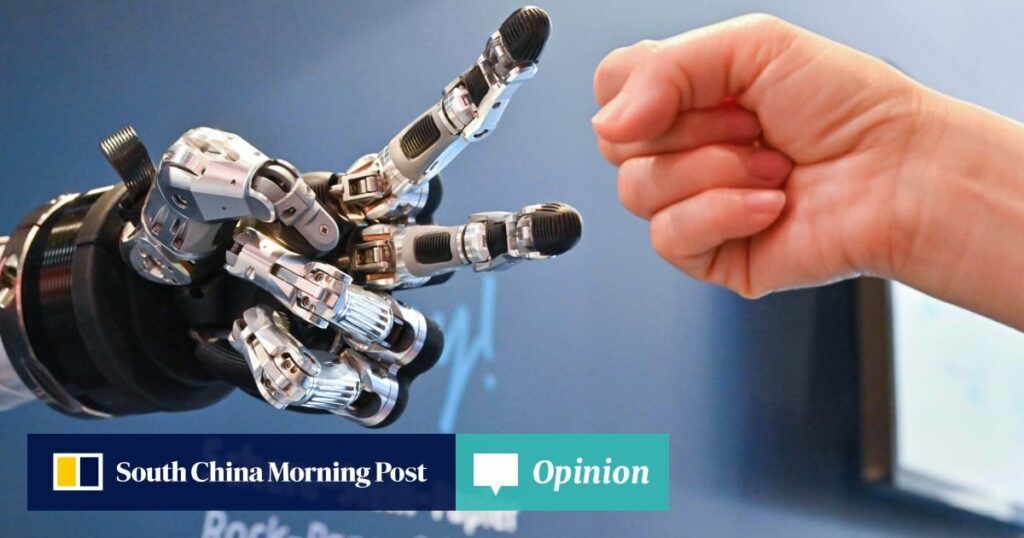The reality is that even though generative AI will have a significant impact across all industry sectors, whether the potential gains in productivity are actually achieved depends on how people, companies, communities and countries carry out these changes.
This is a social and political question given the potential for generative AI to change the way we work by automating many common activities. Language barriers can be removed when AI does automatic translation, prints the transcript and even indicates the next work agenda.
McKinsey estimates that current generative AI and other technologies have the potential to automate work activities that consume 60 to 70 per cent of employees’ time at present. It is no surprise, then, that many workers and employers are looking to the future and seeing uncertainty.
02:38
Apple supplier Foxconn to build ‘AI factories’ using US hardware leader Nvidia’s chips and software
Apple supplier Foxconn to build ‘AI factories’ using US hardware leader Nvidia’s chips and software
The latest European Round Table for Industry (ERT) Competitiveness and Industry Benchmarking Report, released in March, paints a picture of the European Union racing against the clock as the continent’s industries lose ground in global markets in terms of market share. European companies are becoming less relevant, putting the continent’s technological leadership at risk.
The reason for this is obvious. The European market is much more fragmented than that of either the United States or China. It is a collection of national markets, rather than a single one, with many of them sharing a currency in the euro.
The metrics speak for themselves. The EU’s share of global gross value added in mining, manufacturing and utilities fell to 14.5 per cent in 2021, behind China’s 28.3 per cent and 16 per cent for the US. EU firms made up just 15.5 per cent of companies in the Fortune Global 500 in 2023, compared to 31.8 per cent for US firms and 27.5 per cent for Chinese companies.In addition to Europe’s adoption of 5G technology being well behind that of China or the US, it also trails in spending on research and development – a key driver of innovation and technological leadership. The EU spent 2.2 per cent of its GDP on R&D in 2021 versus 2.4 per cent for China and 3.5 per cent for the US.
This shortcoming is particularly evident in industrial R&D investment among the world’s largest 2,500 companies. The EU’s market share fell to 17.5 per cent in 2022, slipping behind China’s 17.8 per cent and being nowhere near the 42.1 per cent of the US.
Add all this to the complexity of EU regulations and the fact that the EU’s energy costs are higher than those in the US or China and it is little surprise European industry’s competitiveness is stagnating. The ERT report says Europe’s regulatory environment needs an upgrade to empower and reward innovators while enhancing the deployment of technology with stronger public-private collaboration.Despite suffering the shocks of the 2008 global financial crisis, Europe has not undertaken the necessary structural reforms to improve competitiveness. The financial sector is dominated by a fragmented banking system and remains risk-averse. German, French and Swiss banks have only remnants of their former global stature, having been hit hard by tighter regulations and inept consolidations.
The real issue is who drives the structural changes. In the US, it is clear that the private sector remains dynamic and committed to profits and innovation. In China, the government and the Communist Party take the lead while allowing corporate competition that is aligned with national goals.
02:03
Chinese-made electric vehicles face additional EU import tariffs of up to 38%
Chinese-made electric vehicles face additional EU import tariffs of up to 38%
The EU still suffers a tension between the old neoliberal aim of free markets and a newer liking for state intervention and industrial policy. As recent experience has shown, policies and programmes can be frustrated by the political process or mired in protracted legal cases by vested interests aiming to hold back change.
Changing an entire ecosystem is a complex process and requires building a common narrative on why change is necessary as well as concrete execution of visible projects which show determination and engender public trust. If you want the economy to change, appoint business leaders who understand how to manage institutional change while remaining business-friendly.
The AI revolution is already upon us. Those who mess up the transition will be marginalised, while those who adapt well will not only survive but thrive. That is the cruelty of Darwinian competition.
Andrew Sheng is a former central banker who writes on global issues from an Asian perspective
Source link : https://amp.scmp.com/opinion/world-opinion/article/3266477/europe-must-embrace-ai-revolution-or-fade-irrelevance
Author :
Publish date : 2024-06-14 12:30:09
Copyright for syndicated content belongs to the linked Source.
